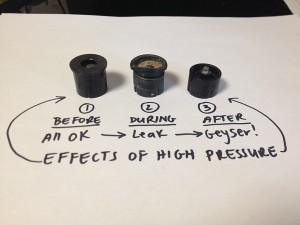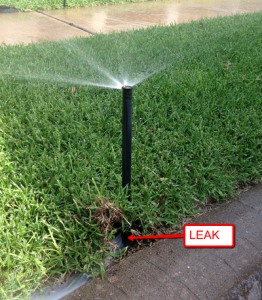How Can I Tell if I Have a Water Pressure Issue?
Posted on April 14, 2014 In addition to shifting soils, prolonged freezing temperatures and pesky squirrels, high water pressure is a major culprit when it comes to causing damages to a sprinkler system. Water pressure can make or break a sprinkler system. The system itself and designed for a specific range of water pressure. Different types of spray heads require different amounts of water pressure, and as the piping moves away from the zone’s valve, the water pressure will decrease.
In addition to shifting soils, prolonged freezing temperatures and pesky squirrels, high water pressure is a major culprit when it comes to causing damages to a sprinkler system. Water pressure can make or break a sprinkler system. The system itself and designed for a specific range of water pressure. Different types of spray heads require different amounts of water pressure, and as the piping moves away from the zone’s valve, the water pressure will decrease.
If your sprinkler system is operating at optimum pressure, then the water being emitted from the spray heads will be in a droplet form, resembling rain. The droplets will have enough weight to fall to the ground, to penetrate the soil and to reach the outer edges of the spray head’s radius before being evaporated by the sun and/or light wind.
Low Water Pressure – If you have a zone where the spray heads are not popping up completely, this could indicate one of two things. Most likely there is a leak and the leak is robbing the pressure to adequately run the zone properly. This could also signify that this zone is not configured properly and that there are too many heads for the amount of water pressure. When low water pressure is in the picture, the water droplets coming from the spray head will not have the momentum to travel the distance that the spray head is designed for. This will give the appearance that there is a coverage issue, causing homeowners to either overwater or feel that they need to add additional spray heads to the zone.
High Water Pressure – You may not know it, but we have all witnessed a sprinkler system in action with high water pressure. If you see excessive misting or fogging at the spray heads, then the water pressure is too high. With the much smaller water droplets, a lot of the water will be evaporated or blown away before being absorbed into the soil. As with the low pressure, when this happens, it will appear that there are coverage issues with the sprinkler system, when in fact the pressure is too high. Also, high water pressure puts a lot of stress and wear-and-tear on sprinkler system components, causing the need for more repairs. High water pressure can break sprinkler heads causing geysers, it can break pipes causing leaks, and can also cause valves to fail and not perform properly.
 Having a water pressure issue, whether it’s a lower pressure issue or a high pressure issue, can undoubtedly cost you money…money in the form of wasted water, dead vegetation, your time, and potentially costly repairs.
Having a water pressure issue, whether it’s a lower pressure issue or a high pressure issue, can undoubtedly cost you money…money in the form of wasted water, dead vegetation, your time, and potentially costly repairs.
Solving a water pressure issue can be as simple as installing a pressure regulator onto your sprinkler system.
Leave a Reply
You must be logged in to post a comment.
There are no comments on this entry.